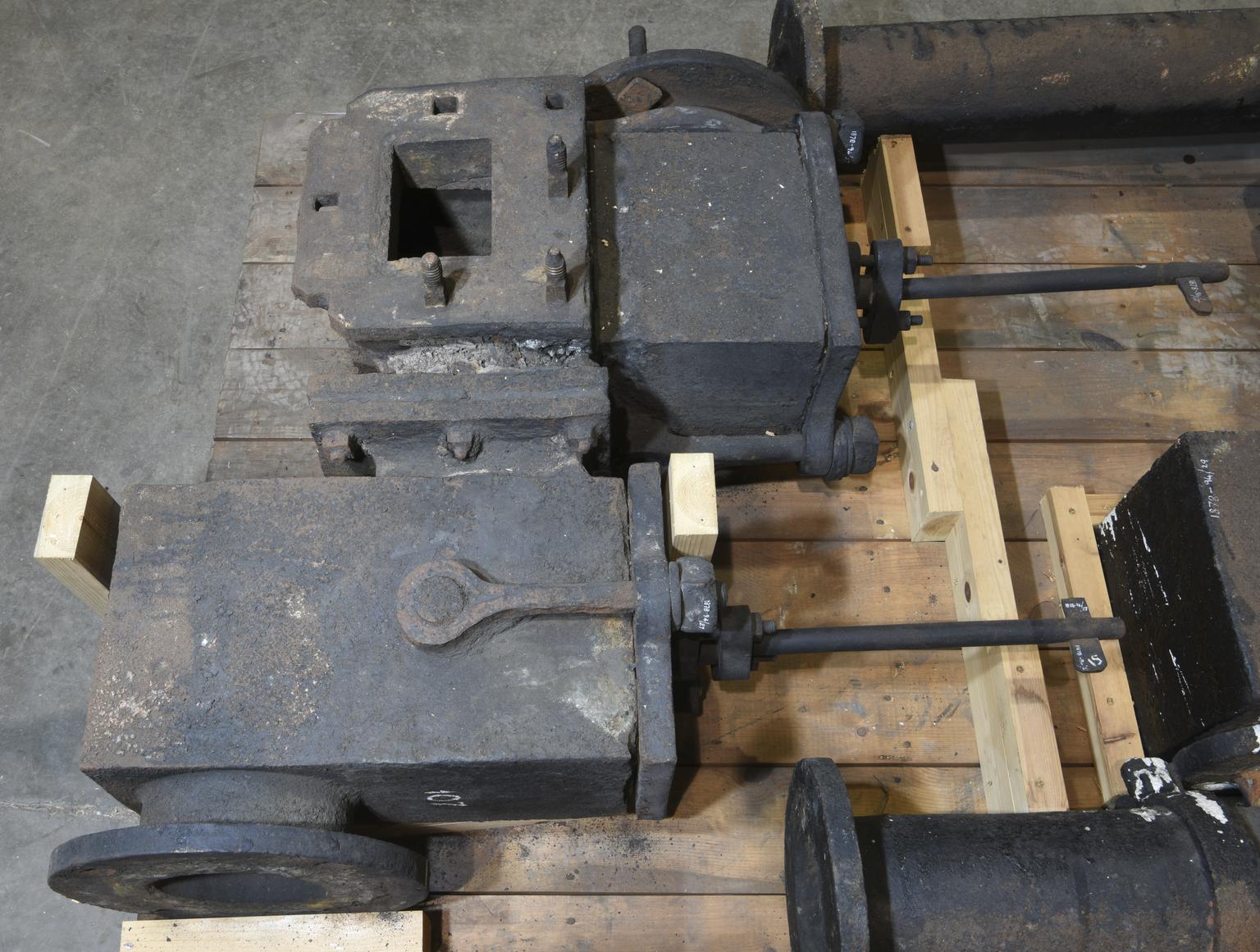2 bottom cills for frame
2 bottom cills for frame (probably replacements made in Patent Museum)
- Object Number:
- 1878-94/1
- type:
- frame
Heslop's winding and pumping engine, 1795. The winding and pumping engine was erected about 1795 by Adam Heslop at Kells Pit, Whitehaven, where it worked for many years; subsequently used at other pits (Castlerigg Pit?; 1837, Wreah Pit, Whingill?). The arrangement is a combination of a single acting high-pressure cylinder with a Newcomen cylinder; patented by Heslop in 1790, although it would appear to have been an infringement of Watt's patent for the separate condenser which remained in force till 1800. Made at the Lowca Foundry/Engineering Works c. 1790.
Adam Heslop patented in 1790 a rotative beam engine in which, by employing two cylinders, he claimed advantages equivalent to those of a single-acting cylinder with James Watt's separate condenser, at a time when the latter's patent was still in force. There is some evidence that it was considered an infringement, but no legal action was taken. The invention was first tried in the neighbourhood of Coalbrookdale; later some fourteen engines, of which this was one, were built in the Whitehaven district. The engine was erected about 1795 at Kell's Pit, Whitehaven, and was used subsequently for winding and pumping at other pits in the district until its removal to South Kensington in 1878.
2 bottom cills for frame (probably replacements made in Patent Museum)
4 oblique uprights supporting centres of spring beams (lower ends of three replaced)
4 uprights supporting ends of spring beams (lower ends replaced)
2 spring beams and 2 side plates for frame
4 corner-blocks for frame and various other make-up pieces in wood, the majority probably made in the Museum
4 long stay-bolts for frame, less gibs, cotters, plates and nuts (see /6); one made in the Museum
Holding down bolts, glands etc. (bolts and bar glands probably made in Museum; 4 cast glands original)
Plummer blocks for Gudgeon complete with brasses (one each); caps (one broken); cover plates; bolts & nuts (photographed without bolts and nuts)
Working Beam
2 beams to support cistern (possibly made in Museum)
Cistern
2 blocks to support cold cylinder and 2 boards to reduce hole in cistern (latter made in the Museum)
Shaft neck bearing complete with 2 brasses, taking up plate, keeper and cotter
Plummer block for neck bearing with bottom brass but no top brass, cap and bolts
Shaft and crank (note crank is staked on only with wood)
Half flywheel (other half not collected by Patent Museum)
Short connecting rods for 'hot' cylinder, complete with brasses etc (one brass broken in two)

Pistons, rod and crosshead for 'hot' cylinder
'hot' cylinder, with bottom and with top cup; the latter is broken in 3 pieces with a small further piece wanting
Long connecting rods for 'cold' cylinder, complete with brasses etc
Pistons for 'cold' cylinder; rod and crosshead. Lacks snift valve

'Cold' cylinder, with bottom, snift branch (but not valve itself) and top cup
Two pairs of crosshead girders

Nozzles complete with 2 valves & cotters to valve spindles

Crossover pipe in 3 separate lengths; top piece has 3 bolts etc in flange

Eduction pipe, 3 lengths bolted together to from a U, with snift valve
Final length of eduction pipe and trap chamber
Air pump bolted to bearing timber with bucket and rod
House pump, with foot, foot valve door (foot valve is probably not present) and length of rising pipe bolted on
Feed pump, apparently complete with piston and rod; handle of one petcock is broken and lost
Plug rod with clevis (top end) and cotter (bottom end) and 5 tappets; link from which plug rod hangs with clevis; house pump bucket (one clack elsewhere) and rod; link from which pump rod hangs with clevis; feed pump rod with 2 cotters to fork (incorrect); delivery piece of feed pump with narrow rising pipe; hanging arm for valve levers with nut, plate & washer and 3 clevis pins; 2 valve levers
2 valve arbors, each with handle, 2 levers, all clevises and weight hooks (find square-hole washers amongst small parts); 2 weights; 2 rods (one with one clevis pin, the other with a bolt & nut) to go between arbors and long levers; 2 valve spindle caps each with a second link, one lacking one clevis; snift valve with rod & clevis, snift valve lever and joint knuckle
Trough for cross-over pipe (probably made in Museum) and 2 pump head launders

Nut, single, from Heslop's winding and pumping engine, 1795